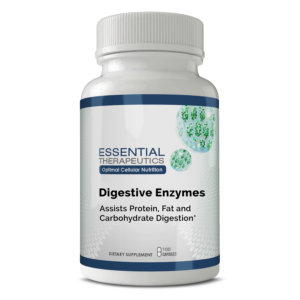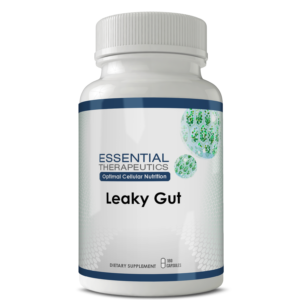Could Your Pain And Fatigue Be Do To This?
Intestinal Permeability otherwise known as leaky gut occurs when the lining of the digestive tract becomes permeable (leaky) to toxins. These toxins then trigger allergic reactions and chronic inflammation. Intestinal permeability allows toxins to leak out of the digestive tract and into the bloodstream. This triggers an autoimmune reaction where inflammatory chemicals like kinins and bradykinins can create pain and inflammation in any of the body’s tissues.
With leaky gut, damaged cells in your intestines don’t produce the enzymes needed for proper digestion. As a result, your body cannot absorb essential nutrients, which can lead to hormone imbalances and a weakened immune system.
Could some of the diffuse, achy all over pain, associated with fibromyalgia, be coming from your gut? Yep.

Most of my patients have poor digestion, malabsorption, and often take heartburn medications or worse NSAIDs. Many have been on numerous antibiotics or taken steroids-These drugs deplete your natural digestive enzymes.
Once you deplete your natural digestive enzymes, through poor diet or prescription drugs, you become at risk of developing malabsorption and leaky gut syndrome.
The use of non-steroidal anti-inflammatory drugs, steroids, antibiotics, antihistamines, too much caffeine and alcohol, and other prescription and nonprescription drugs renders the intestinal mucosa permeable to toxins and undigested food particles. This can then lead to allergic reactions resulting in pain generating chemicals.
NSAIDs – Pain Meds and Leaky Gut
Ibuprofen, a drug in the family of medications called Non-Steroidal Anti-inflammatory Drugs (NSAIDs), can cause what is often referred to as ‘leaky gut syndrome’ (LGS). This is thought to lead to stomach ulcers that can result in upper gastrointestinal bleeding, the need for surgery and blood transfusions.

“The risk may be higher for people who take NSAIDs for a long time, are older in age, have poor health, or who drink three or more alcoholic drinks per day while taking ibuprofen.”
Another study by NIH concluded that NSAIDs weaken the intestinal walls and using these drugs for the long-term leads to inflammation of the small intestine.
Here’s a list of common NSAID medications:
- Advil / Motrin (ibuprofen)
- Aspirin
- Aleve (naproxen sodium)
- Celebrex
- Naprosyn (naproxen)
- Lodine (etodolac)
- Mobic
- Nalfon (fenoprofen)
- Daypro (oxaprozin)
- Ansaid (flurbiprofen)
- Cambia / Cataflam / Voltaren (diclofenac)
- COX-2 Inhibitors
Potential side effects of other NSAIDS:
These drugs deplete your natural sleep hormone melatonin-not good for those who struggle with sleep…
NSAIDs increase blood pressure. If you have high blood pressure consider stopping your NSAIDs for a few weeks and see if your blood pressure comes down.
A person taking NSAIDs is seven times more likely to be hospitalized for gastrointestinal adverse effects. The FDA estimates that 200,000 cases of gastric bleeding occur annually and that this leads to 10,000 to 20,000 deaths each year. NSAIDs more than double a person’s risk of developing high blood pressure, possibly leading to more medication. In one study, 41% of those who had recently started on medication to lower their blood pressure were also taking an NSAID.
Intestinal permeability is associated with:
Increased over all pain or diffuse achy pain as well as –
- Chronic diarrhea, constipation, gas or bloating
- Nutritional deficiencies-resulting in numerous problems
- Poor immune system
- Headaches, brain fog, memory loss
- Excessive fatigue
- Skin rashes and problems such as acne, eczema or rosacea
- Cravings for sugar or carbs
- Arthritis or joint pain and diffuse achy pain
- Depression, anxiety, ADD, ADHD
- Autoimmune diseases such as rheumatoid arthritis, lupus, celiac disease or Crohn’s
To treat leaky gut my patients are instructed on how to implement my elimination diet while taking the essential supplements to repair the gut.
For minimum of two weeks avoid all gluten, wheat, millet, spelt, barley, dairy (butter is fine), eggs, sodas, drastically reduce sugar, and eliminate all nightshades. Nightshades are white potatoes, eggplant, black pepper, tobacco; these things have a certain alkaloid in them that when some susceptible folks eat them, they get inflammation. That oftentimes will manifest itself in their joints. I see that oftentimes with patients with rheumatoid arthritis, sometimes in Sjogren’s, sometimes in Lupus, but definitely rheumatoid arthritis. But it doesn’t have to be an autoimmune disease. It can be any type of pain. Typically, you’ll see the pain in your hands, knees and feet; in your extremities.
The only way to really know if you’re being affected, and I see a response for nightshades in about 30% of the people who try this. However if you’re one of the 30% and you find that eating white potatoes, a baked potato every couple of days, or eating eggplant or lot of pepper, you find that by giving that up, you don’t have pain in your hands like you used to, which you used to attribute to osteoarthritis or rheumatoid arthritis-it’s certainly worth going off those foods, at least for the majority of the time.

The diet is done for one month.
After being off these products for 1 month, you typically find that you have more energy, are more clear headed, have less pain, and usually have lost some unwanted weight.
Then what you want to do is you add these foods back, one at a time. You’ve been off dairy for a month and what you want to do is when you come off the diet, you eat dairy 2-3 servings that day and then you go back on the diet for 3 days, because it may take 3 days before you have a reaction to dairy or to wheat, gluten, sugar or soy, whatever it is. You challenge it, 2-3 servings one day and then you go off that food for 3 days, because food allergies or food intolerances oftentimes are not immediate. Most of the time, in fact the majority of the time, they’re delayed sensitive reactions; they may take up to 72 hours.
What you’ll find is oftentimes once you start adding back these foods that you’ve been off for a month, you may find that when you eat a lot of sugar one day, then the next day, you have a lot of fibro fog, low moods, your blood pressure goes up, you have loose bowel movement, or you feel run down. It could be that you add nightshades back; you get a bunch of potatoes one day, maybe you eat a baked potato and some French fries, some peppers. Then 2-3 days later, you start getting the achy pain in your hands again that had gone away over the last month.
What you want to do is pay attention to these things. As they show up, if they’re real blatant then obviously you know that that food group triggered it.
The following steps can help you treat and reverse intestinal permeability. They are outlined in greater detail in my book, Treating and Beating Fibromyalgia.
- Supplement with digestive enzymes, as well as HCl if stomach acid levels are a problem for you.
- Use bone broth on a daily basis. My friend Dr. Josh Axe and Ancient Nutrition are leaders in the field https://preview.tinyurl.com/yc847uhd
- Steer clear of starchy foods and avoid sugar as much as possible
- Take a good, quality probiotic to help build healthy bacteria in the gut, which will make the tissues stronger. Take three a day on an empty stomach.
I recommend using a high dose probiotic 25-50 billion count, preferably one that comes from your local health food store, right out of the refrigerator. If order on line make sure it is enteric coated or protected from stomach acid.
- Start the elimination diet. This is explained in detail in another post. It’s used to help pinpoint any possible food allergies. It pays particular attention to gluten, the protein that is found in wheat and most grains. Gluten can be highly irritating to the intestinal lining.
- Make sure you are taking the right supplements at the right dosage. It is my professional recommendation (as well as most of my Functional Fibro Medicine associates’) that you take a special powdered multivitamin. Make sure that one of your supplements includes 1000 to 2000 mg of fish oil daily. The omega-3 fatty acids in these fish oils help to repair the tissue lining and reduce inflammation. In addition to this, one study showed that 2.7 grams (2700 mg) of fish oil daily would put Crohn’s disease into remission status.
- For optimal results, take high-dose L-glutamine (an amino acid) and additional herbs. Glutamine is the primary fuel for intestinal cell function, so a high dose of up to 6000 mg would need to be used to meet the demands of a leaky gut and ensure proper liver functioning. It also helps boost the immune system and rest of the GI tract during times of psychological distress like periods of depression or grief. Chronic use of NSAID’s and antibiotics can deplete proper chemicals and create toxic levels of ammonia. This high dose of glutamine will help restore your stores and transport the ammonia concentrations to the kidneys to be excreted.
Acacia is a non-bulk forming, soluble fiber that is readily fermentable for growth of the healthy bacteria, Lactobacillus. It helps with water absorption and supports cell function in the colon as well.
Nutra-Flora FOS will further encourage growth of healthy and beneficial microorganisms by supplying non-digestable fructoligosaccharides.
And finally, N-acetyl-D-glucosamine is a mouthful to say, but highly beneficial for the protection of the intestinal tissues. It is used as a structural component of mucus secretions in the intestines and helps with the passage of food through the digestive tract.
I recommend using the above “Leaky Gut Formula” or something similar for two months.
Fibromyalgia Live! Join Me Every Wednesday Night 6pm CDT at The NEW Your Fibro Doctor Facebook Group!
What Is Fibromyalgia? What Causes It? Who Gets It And Why?
Get all the answers at endfibronow.com
These patients and hundreds of others who’ve worked personally with me have in fact beaten their fibromyalgia. You can read or listen to their stories by clicking the link below:
|
|













Leave a Reply
Want to join the discussion?Feel free to contribute!